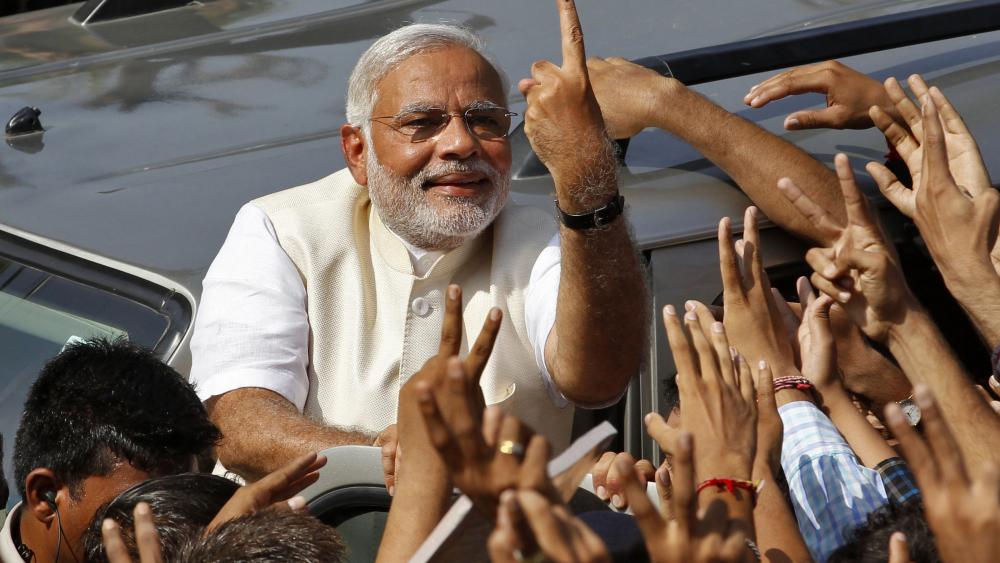PM Modi has emerged as the most charismatic and popular leader in recent times, whose popularity has been much attributed to his public interaction. To facilitate enhanced public-leader interaction, PM Modi has been very vocal in his approach, ensuring his voice reaches the masses. To do this, he has taken many unprecedented steps such as starting a radio interaction, ‘Mann Ki Baat’, building a massive social media and television media presence along with physically holding rallies and road shows. One the major factors in this has been his television interviews, which have not only enabled the citizens to know about the NDA government’s policies and measures but has also given them a glimpse of the man behind the name.
PM Modi has given interviews to almost all the major media organizations in the country, be it print or television. However, there is one media organization which the Prime Minister has stayed away from in the past 5 years, NDTV group. The media organization is known to be highly biased and unfair against anyone who strays away from the “left wing ideology” sphere that the channel and its journalists believe in.
For this reason, the opposition with Congress at the forefront, in their attempts to undermine the current government has been regularly stating that the Modi government does not interact with the media. Unless the opposition doesn’t consider The Tribune, PTI, Network 18, Indian Express, News Nation, India Today, Zee News, Times Now, CNN,India TV, Rajasthan Patrika, Hindustan Times, Dainik Jagran, Nai Duniya, Hindusthan Samachar, Navbharat Times, Times of India, Amar Ujala, The New Indian Express, DD News, UNI, ANI, ABP News, Republic, YourStory, Time Magazine; as media, then it is acceptable, that the Prime Minister is indeed not talking to the media. Moreover, just recently, he had a friendly interaction with Bollywood celebrity, Akshay Kumar; in order to share some of his personal life’s details with the citizens.
Just because PM Modi hasn’t ever given an interview to NDTV, which seems to be Congress’ personal spokesperson at times, the opposition has proclaimed the government to be shying away from the media. During his interviews to organization such as the Indian Express, among others, the Prime Minister has answered every single question put to him (some uncomfortable too). However, he has boycotted NDTV, and for good reason.
Far from being a neutral platform, all NDTV is interested in is furthering their personal agenda. Starting from the year 2002, NDTV”s coverage of Gujarat was questioned by many people. Barkha Dutt, who was working for NDTV then, had personally indulged in unethical coverage during the riots. Her announcement to the country that a “hanuman temple has been vandalized”, when in fact this was a fabrication and further announcing that “Surat’s diamond market is free of policemen”, thus, informing the rioters of the unprotected areas; are some of the instances through which the channel had failed to uphold the basic ethics of journalism. Moreover, in a riot situation wherein the journalists aren’t ethically supposed to mention the names of the communities, NDTV did just that, prompting the Gujarat government to ban its telecast. The coverage of Gujarat riots by NDTV has been critically examined Madhu Purnima Kishwar in her book Modi, Muslims, and Media: Voices from Narendra Modi’s Gujarat.
One would think that NDTV learnt its lesson but alas not. In 2016, NDTV had suffered quite a big setback when the channel had been ordered by the Union Ministry of Information and Broadcasting to go off air on November 9 for divulging ‘strategically sensitive’ details while covering January’s deadly attack on the Pathankot air base though the ban wasn’t implemented. In a live telecast, the channel had revealed the exact location of the suspected Pakistan-based terrorists involved in the attack on the Pathankot air base. The ministry felt that such crucial information could have been readily picked by terrorist handlers and could compromise national security.
While these instances have been a threat to external and internal security of the nation, making them extremely severe, the channel has been overall biased in its reporting, so much so, that the Modi government had decided to boycott the media organization. PM Modi had given a fair chance to the channel in the run up to the 2014 elections, during which time, ignoring his policies and changes to be implemented in the government, all NDTV was interested in was, what happened in 2002, obviously considering themselves to be above the Supreme Court since Narendra Modi had been cleared of all charges. After NDTV journalist Vijay Trivedi spread vicious rumours about him, PM Modi had decided to “never give legitimacy to NDTV by giving them an interview or responding to any questions from them”.
Nevertheless, the last straw had been when the NDTV twitter account falsely attributed a tweet to Sushma Swaraj, which questioned the move to let the party’s prime ministerial candidate, Narendra Modi, contest from the Varanasi seat. Even though Both NDTV and Barkha Dutt apologized, PM Modi had just about had enough. BJP had then decided to boycott the channel altogether.
NDTV’s founder Radhika Roy owns 29.18% stake together with her husband. She happens to be the sister of CPI leader Brinda Karat. Moreover, 14% stake is held by Abhey Oswal, who is the father-in-law of Congress MP Naveen Jindal. Having such blatantly biased relations, coupled by the misreporting, BJP does not want to waste its time indulging in interviews with NDTV. Having given interviews with all the major media houses, which are legitimate and neutral in their approach; is enough for BJP to maintain transparency in the government and to keep the citizens well informed.
